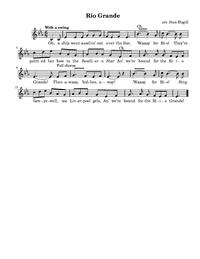Difference between revisions of "Rio Grande"
| Line 6: | Line 6: | ||
| filename=rio_grande | | filename=rio_grande | ||
| altname=Away, Rio | | altname=Away, Rio | ||
| + | | altname2=Away for Rio | ||
| + | | altname3=Bound for the Rio Grande | ||
| digitrad=4973 | | digitrad=4973 | ||
| mudcat=79100 | | mudcat=79100 | ||
| musicbrainz=52d24891-c4ca-47d1-af68-a178c3bc603a | | musicbrainz=52d24891-c4ca-47d1-af68-a178c3bc603a | ||
}} | }} | ||
| + | == Liner Notes == | ||
| + | “[[Rio Grande]]” is track 1 on ''[[Shower Chanteys]]''. | ||
| + | |||
| + | “Rio Grande” is a capstan or windlass chantey, exclusively used for raising the anchor on an outward-bound trip. I first learned this song at the [[San Francisco chantey sing]]; my version is fairly close to that of [[Salty Walt and the Rattlin’ Ratlines]]. | ||
| + | |||
| + | According to Hugill<ref>Stan Hugill. ''Shanties from the Seven Seas'', pp. 80–87. New U.S. Edition. Mystic, Conn.: Mystic Seaport, 1994.</ref>, the place in question is Rio Grande do Sul, in Brazil, though his assertions should always be taken with a grain of salt. All the sources<ref>Joanna C. Colcord. ''Songs of American Sailormen'', pp. 85–87. Enlarged and Revised Edition. New York: Bramhall House, 1938.</ref><ref>Laura Alexandrine Smith. ''The Music of the Waters'', pp. 10–12. London: Kegan Paul, Trench & Co., 1888.</ref> and all recordings I’ve ever heard badly mispronounce the place, as I do as well; it is always Rye-o Grand, never Ree-o Grahn-day. Sailors were generally abominable about furrin place names. | ||
| + | |||
| + | Hugill gives six variations; the first is transcribed in the first page of the PDF linked here, as I was messing about with the [[LilyPond]] software I used to put the arrangement together. | ||
| + | |||
| + | The first version that I recorded can be heard in [https://www.kickstarter.com/projects/crism/shower-chanteys/description the Kickstarter campaign video]. It was a little tricky getting pitches right; [[Jim Prendergast]], my recording engineer, suggested making MIDI guidetracks, which is what led to this whole songbook and online liner notes project as a side-effect. I had a cold while I was arranging this song, and originally arranged it in F, then F♯, then G, all of which are way out of my normal range. I believe I ended up recording it in A♭, still a touch below my normal range, for our second take, which sounded much more solid, and is what’s on the album. | ||
| + | |||
| + | <!-- colcord, 85–87: outward-bound capstan/windlass --> | ||
| + | <!-- smith, 10–12: outward-bound --> | ||
| + | |||
| + | == References == | ||
| + | <references/> | ||
| + | |||
[[Category:Chris’s songs]] | [[Category:Chris’s songs]] | ||
[[Category:Shower Chanteys]] | [[Category:Shower Chanteys]] | ||
Revision as of 18:18, 9 September 2018

“Rio Grande” is a sea chantey.
Alternate names
- Away, Rio
- Away for Rio
- Bound for the Rio Grande
External links
- “Rio Grande” at The Digital Tradition on the Mudcat Café
- “Rio Grande” discussion on the Mudcat Café
- “Rio Grande” at MusicBrainz
Liner Notes
“Rio Grande” is track 1 on Shower Chanteys.
“Rio Grande” is a capstan or windlass chantey, exclusively used for raising the anchor on an outward-bound trip. I first learned this song at the San Francisco chantey sing; my version is fairly close to that of Salty Walt and the Rattlin’ Ratlines.
According to Hugill[1], the place in question is Rio Grande do Sul, in Brazil, though his assertions should always be taken with a grain of salt. All the sources[2][3] and all recordings I’ve ever heard badly mispronounce the place, as I do as well; it is always Rye-o Grand, never Ree-o Grahn-day. Sailors were generally abominable about furrin place names.
Hugill gives six variations; the first is transcribed in the first page of the PDF linked here, as I was messing about with the LilyPond software I used to put the arrangement together.
The first version that I recorded can be heard in the Kickstarter campaign video. It was a little tricky getting pitches right; Jim Prendergast, my recording engineer, suggested making MIDI guidetracks, which is what led to this whole songbook and online liner notes project as a side-effect. I had a cold while I was arranging this song, and originally arranged it in F, then F♯, then G, all of which are way out of my normal range. I believe I ended up recording it in A♭, still a touch below my normal range, for our second take, which sounded much more solid, and is what’s on the album.
References
- ↑ Stan Hugill. Shanties from the Seven Seas, pp. 80–87. New U.S. Edition. Mystic, Conn.: Mystic Seaport, 1994.
- ↑ Joanna C. Colcord. Songs of American Sailormen, pp. 85–87. Enlarged and Revised Edition. New York: Bramhall House, 1938.
- ↑ Laura Alexandrine Smith. The Music of the Waters, pp. 10–12. London: Kegan Paul, Trench & Co., 1888.